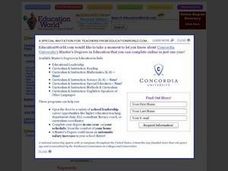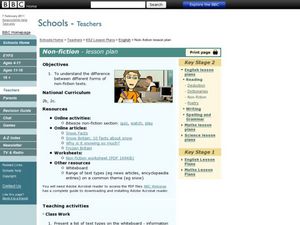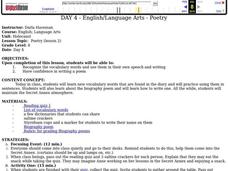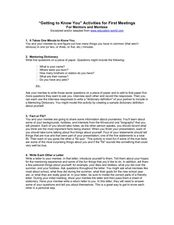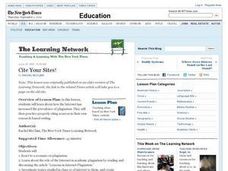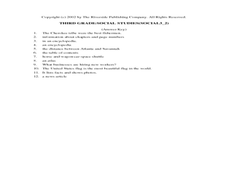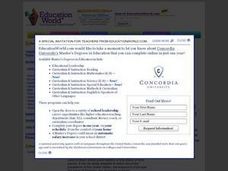Curated OER
"Me" Resource
Learners elucidate themselves by writing up to six entries in different formats. Some formatting choices include a dictionary, encyclopedia, or atlas entry, a magazine article, a newspaper article, and a table of contents. Some...
Curated OER
A Dictionary of Democracy
Students create dictionary of terms for citizens of a democracy, using events and biographies from both their state's history and U.S. history.
Curated OER
The Life Cycle of the Butterfly
First graders, after listening to fictional and non-fictional literature about caterpillars, and observing caterpillars from egg to butterfly, write a "biography" of a caterpillar using appropriate vocabulary and time lines.
Curated OER
An Illustrated Guide to the Late 1800's
Eleventh graders investigate the time of the late 1800's. They conduct research using a variety of resources that could include the internet. Students create an alphabetized encyclopedia of important historical people of the time period.
Curated OER
American Studies
Entitled American Studies, this small unit covers various topics related to the study of the United States. Learners warm up by creating a dictionary of democracy, then dive into three different lessons focused on government, famous...
Student Handouts
Why Does an Author Write?
To get to the heart of a writer's purpose, just remember to have some PIE (Persuade, Inform, or Entertain)! And appropriately, here is a PIE chart that leaves room for pupils to identify each letter of the acronym and any other...
Curated OER
Non-Fiction Texts
Third graders examine different types of non-fiction texts. In this non fiction lesson, 3rd graders use different types of texts to gather information. Students work in groups to analyze the texts for author's purpose, common...
Curated OER
Holocaust
The Holocaust is the focus of this interactive poetry strategy. The classroom will be set-up to remind students of the Secret Annex, with a table, lamp, and various other props. Each participant will receive 3 Saltine crackers and...
San Francisco Symphony
Learning Adjectives through the Duke
Duke Ellington, jazz, and jive kick-off a fun and creative lesson on responding emotionally to music. The class will learn about jive talk used in the 1920s and the life and music of Duke Ellington. They'll listen to a selection of his...
Curated OER
"Getting to Know You" Activities for First Meetings
In this getting to know you worksheet, students participate in activities such as fact or fib, dictionary conversations, and more to get to know each other. Students are given 6 activities.
Curated OER
A Dictionary of Independence
Learners use events and biographies from their state's history and U.S. history, to create a dictionary of terms for citizens of a democracy.
Curated OER
Cite Your Sites
What information would you find in an almanac that you would not find in an atlas? What is the difference between a dictionary and a thesaurus? Using a Cite Your Sites worksheet on which they record their observations, groups participate...
Curated OER
Boston Women: The Struggle for Freedom 1760 -1850
Fifth graders investigate the lives and various accomplishments of selected women of Boston.In this famous women writing lesson, 5th graders research biographical information. Students discuss the achievements of these women using...
Curated OER
Writing: Narrative, Expository, Persuasive, and Descriptive
If you are interested in having a basic framework for teaching expository, narrative, persuasive, and descriptive writing, this resource may help; however, you will have to find information on the different forms of writing to share with...
Shodor Education Foundation
Life
How does life evolve? The interactive provides a simulation based on the Game of Life invented by mathematician John Conway. Users can run the applet with the preset rules and settings or adjust them to view whether overpopulation or...
Curated OER
Passage to Freedom
Lead students through the process of reading with a critical eye. It focuses primarily on vocabulary and reviewing reading comprehension strategies. This PowerPoint includes multiple web resources to reference.
Curated OER
3rd Grade Social Studies Core Skills (Reference Books)
In this reference materials activity, students complete the 20 multiple choice questions pertaining to the correct book needed to find the answer in each situation. Included are dictionary, atlas, encyclopedias, newspapers and maps.
Curated OER
Intermediate Matching – Types of Books
In this book genre activity, students draw a line from the book type words to their definitions. They match nine words, which include dictionary, cookbook, encyclopedia, and fiction, with the definition that best describes it.
Curated OER
The Life Cycle of the Butterfly
Students examine the life of a butterfly. They write a biography from the point of view of a caterpillar using new vocabulary. They use magnifying glasses to examine butterflies and caterpillars.
Curated OER
Meeting our Basic Needs
Students brainstorm the basic needs of the community and create a chart. In this volunteerism lesson, students recognize people in the community who have given charity in the community. Students read biographies of these charitable...
Curated OER
The Tell-Tale Hearts of Writers
Knock, knock, knock...Creep out your class with a critical thinking lesson focused on word relationships in Edgar Allen Poe's "The Tell-Tale Heart." They investigate the relationship between word choice, mood, and interpretation of...
Curated OER
Social Studies Review Third Grade
For this review of various skills worksheet, students answer multiple choice questions about Georgia history, references, fiction and nonfiction, and U.S. history. Students answer 12 questions.
Curated OER
Interviewing Famous Leaders in History
Students explore historical figures. In this history/research lesson, students use a variety of research materials to learn about the historical figure of their choice. Students write questions and responses as if they were interviewing...
Curated OER
"Spelldown" by Becky Mushko
Learners read Spelldown, by Becky Mushko and consider how it portrays the Appalachian community. They define and discuss vocabulary presented in the story and write a comparison/contrast paper analyzing two of the story's characters. The...


